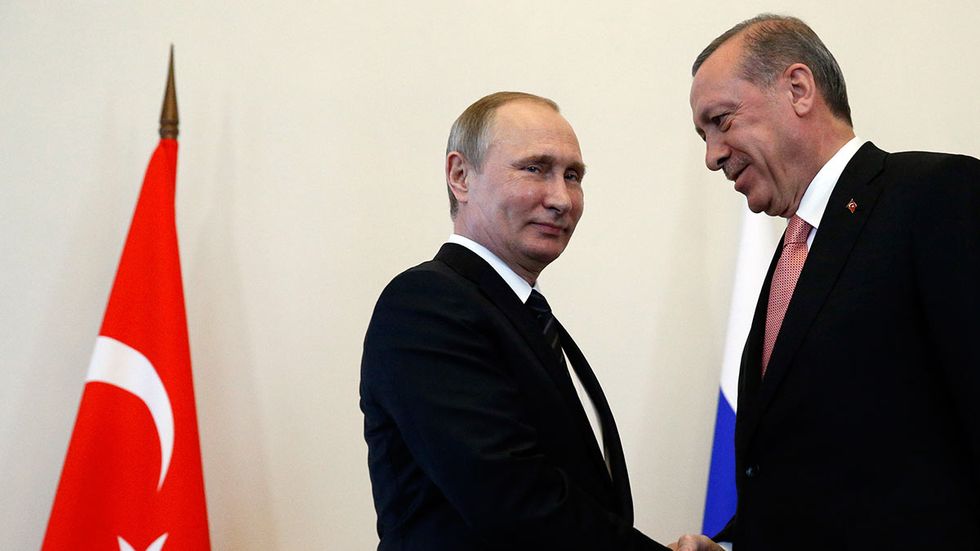
© 2024 Blaze Media LLC. All rights reserved.
On the eve of Turkish President Recep Tayyip Erdogan’s visit of Russian President (and “dear friend”) Vladimir Putin in St. Petersburg this week, the North American Atlantic Treaty Organization (NATO) went out of its way to appease the Turks.
Seeking to tamp down “speculative press reports regarding NATO's stance regarding the failed coup in Turkey and Turkey’s NATO membership” — and apparently timed to correspond with an apparent rapprochement between Turkey and NATO adversary Russia — NATO released a statement reaffirming its support for Turkey.
The statement reads in part:
Turkey is a valued Ally, making substantial contributions to NATO's joint efforts… Turkey’s NATO membership is not in question. Our Alliance is committed to collective defence and founded on the principles of democracy, individual liberty, human rights and the rule of law. NATO counts on the continued contributions of Turkey and Turkey can count on the solidarity and support of NATO.
If this statement baffles you in light of the Islamic supremacist Erdogan regime’s widespread support for jihadism and its authoritarian actions in the wake of the recent attempted coup, you are not alone.
On the Islamic supremacist front, Turkey’s efforts have ranged from actively aiding and abetting jihadist groups, to turning a blind eye to their operations and persecuting minorities. Consider that Erdogan’s regime has, among other things…
- Backed Sunni jihadist opponents of Syrian President Bashar Assad’s regime in Syria, by facilitating the transfer of material support in terms of arms and money to al-Qaeda linked terrorist Jabhat al-Nusra, among other groups
- Allegedly worked with ISIS, including, in effect, underwriting the jihadist group through the purchase of perhaps hundreds of millions of dollars’ worth of oil — ISIS’ lifeblood
- Failing to seal its borders — wittingly or unwittingly — from jihadists seeking to join ISIS and other Islamic supremacist movements, and effectively blackmailing the EU vis-à-vis Erdogan’s threat to keep open the spigot of refugees flowing from Turkey to EU member-states absent a multi-billion payment
- Brutally attacking Turkey’s Kurdish minority
On the home front, in City Journal, longtime Turkey observer Claire Berlinski chronicles the extent to which Erdogan has moved to consolidate power and purge the nation of opponents, just in the past several weeks following the failed coup:
BSuspects apprehended on suspicion of involvement in the plot appear from photographs to have been beaten. They have been denied access to lawyers. About 20 news websites critical of the government have been shut down. The government has published lists of journalists to be arrested, and effectively banned foreign travel for civil servants — 3 million people, nearly 5 percent of the population. Thirty district governors have been replaced. Some 9,000 police and interior ministry officials have been suspended; 2,700 judges and prosecutors have been removed from their posts. Turkey’s board of higher education has requested the resignation of 1,577 university rectors and deans. Another 15,000 state education employees have been suspended. The state news agency reports that nearly 400 employees of the ministry of family and social policies have been stripped of their responsibilities. […]
Tuesday’s announcement that the licenses of 21,000 private schoolteachers have been suspended brings the total number of those suspended or detained to about 60,000. The so-called “parallel state” seems to be almost as large as the official one — and this isn’t counting all the suspected followers of Gülen in the Turkish civil service, judiciary, and police who had already been purged over the past two and a half years.
While, of course, outright treason must be punished, the extent of Erdogan’s purge, and the lengths to which he has gone to achieve it in complete contravention of NATO’s purported “principles of democracy, individual liberty, human rights and the rule of law,” is staggering.
Indeed by letter and spirit, as reflected in word and deed, Erdogan’s Turkey has been in direct non-conformance with NATO on the basis of the organization’s preamble alone — which reads:
The Parties to this Treaty reaffirm their faith in the purposes and principles of the Charter of the United Nations and their desire to live in peace with all peoples and all governments.
They are determined to safeguard the freedom, common heritage and civilisation of their peoples, founded on the principles of democracy, individual liberty and the rule of law. They seek to promote stability and well-being in the North Atlantic area.
They are resolved to unite their efforts for collective defence and for the preservation of peace and security.
Erdogan’s palling around with Putin notwithstanding, NATO may view Turkey as a bulwark against the Russians. But the actions of the Erdogan regime in support of jihadism abroad, and totalitarian Islamic supremacism at home, must not be ignored if NATO is to maintain any legitimacy.
Foreign policy is a constant changing battlefield in perpetual flux, whereby enemies in some situations are friends in others, and lesser adversaries at times must be worked with in order to counter great ones.
But the U.S., as the most powerful NATO member, must have moral clarity with respect to Turkey. Its turn away from Ataturk under Erdogan, and toward Islamic supremacism abroad and Islamic autocracy at home, is utterly antithetical to NATO’s mission and America’s national interest.
Unlike the Obama administration, which has counted the Turkish president among his best friends on the world stage, the next U.S. president ought to demand that Turkey cease all support for jihad and restore law and order — or face real consequences.
Want to leave a tip?
We answer to you. Help keep our content free of advertisers and big tech censorship by leaving a tip today.
Want to join the conversation?
Already a subscriber?
more stories
Sign up for the Blaze newsletter
By signing up, you agree to our Privacy Policy and Terms of Use, and agree to receive content that may sometimes include advertisements. You may opt out at any time.
© 2024 Blaze Media LLC. All rights reserved.
Get the stories that matter most delivered directly to your inbox.
By signing up, you agree to our Privacy Policy and Terms of Use, and agree to receive content that may sometimes include advertisements. You may opt out at any time.


